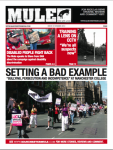Police cornered by budget cuts means bad news for activists
Article published: Monday, September 20th 2010
The cutting of police funds and numbers is likely to make them target activists more surgically warns Kevin Blowe.
Before the war on public services really begins with the coalition government’s spending review in October, we can only guess at the extent of what is coming. It’s an uneasy feeling for everyone, this time including areas of government spending that have traditionally been protected, notably Britain’s 43 police forces. In June, the Association of Chief Police Officers (ACPO) lead on finance, North Yorkshire Chief Constable Graham Maxwell, told Police Review, “I have been in policing for 27 years and each time someone says ‘budgets are tough, budgets are going to be harder’, that meant that we did not get a large increase. It did not mean they took money away from us. This is what it means this time.”
That a government led by the Conservatives, consistently self-styled as the party of law and order, plans to drastically reduce numbers of police officers underscores their scorched-earth approach to public debt. As Chief Constables negotiate with ministers over the next three months, both face a number of dilemmas highlighting the uncertainty also existing within government circles.
Firstly, neither the government nor the police really know how the public will react to massive cuts. Although the prospect of Greek-style organised resistance seems remote, no matter how much the left may wish it were otherwise, it is difficult to predict how extensive crime and public disorder will be. Even if public opposition follows its usual path of noisy but generally peaceful protest, containment will still require large numbers of police. If opposition is diffused around the country – likely as local councils lead the implementation of cuts – numbers needed for public order duties may be larger still. Factoring in increasing racist backlash against migrants, illustrated by the English Defence League, and parallel counter-demonstrations, recently impoverished state bodies are likely to face an enormous increase in street protest.
Additionally, in its review of the April 2009 anti-G20 protests in London, the Independent Police Complaints Commission recommended that public order police must have a minimum eight-hour break between shifts, to avoid any suggestion that ‘exhaustion’ explains increasingly aggressive confrontations with protesters. The organisation representing the ranks, the Police Federation, replied that this means deploying more officers to fill the gaps. Considering the uncertain fate of the UK’s 16,000 Community Support Officers, whose ring-fenced funding is set to end under the new government, the question arises: where will the extra officers come from?
In fact, it is likely that cheaper alternatives will be grasped at. Cheaper options include targeting potential “troublemakers” even more than at present; restricting the movement of activists travelling to demonstrations and using powers infamously employed against striking miners in the 1980s, banning some public protests altogether.
Who might be targeted? We know that ACPO has a previously secret database of ‘domestic extremists’ (a term with no basis in law) that currently holds the names of 1,471 people. Already, campaigners with no criminal record or history of violence are included in it. Collecting information while planning police responses to protests is inexpensive, resulting in more and more people being added to the database. This approach would lead to more ‘forward intelligence team’ (FIT) officers photographing protesters; more dawn raids against ‘extremist elements’ and greater readiness to use powers preventing people from covering their faces. Ironically, because it is cheaper to centralise this collection of data, a government that so often stressed the importance of ‘localism’ in opposition may end up nationalising intelligence gathering.
A final feasible new measure is armament, especially considering the host of severe public order challenges happening soon, besides any protests. In two years time, London is likely to resemble an armed camp as the capital hosts the biggest security headache on the planet, the Olympic Games. There is also the Commonwealth Games in Glasgow in 2014 any number of state visits and summit meetings that Cameron decides to host. We’ve grown accustomed to seeing police with automatic rifles at airports and, despite polling evidence of public disquiet on the issue, it does not seem too far-fetched that a regional force will become the first fully armed in Britain during day to day policing.
This article features in the print edition of The Mule – Issue 10, out now for FREE around Greater Manchester
More: Cuts, Features, Policing
Comments
No comments found
The comments are closed.





